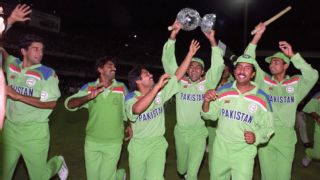|
In hindsight, it wouldn't have been a bad thing had Pakistan taken a slightly more straightforward route to the 1992 World Cup title. It might have been better if they hadn't needed rain against England to grant them the point necessary for qualification. Or, if they hadn't begun the tournament so disastrously, and been forced to pull themselves back from the brink and embark upon that run that ended with Imran Khan holding aloft the trophy. After all, Pakistan were one of the top two ODI sides in the world - across five years - leading up to that World Cup. They had won five tournaments in Sharjah, and five of their seven bilateral series at home. In 1989, they triumphed in the Nehru Cup in India, which featured every Test side at the time except New Zealand; it was, in effect, a mini-World Cup. They had won 57 of 101 ODIs in the five years that preceded the tournament, a ratio only bettered by Australia. Had they simply romped to the semi-finals, put together a couple of good games and won the tournament in that manner, the achievement would have been commensurate with their status, but certainly not as dramatic. In triumphing the way they did, they set the narrative for the following 27 years: Unpredictable Pakistan. Unpredictable Pakistan do not care for statistics or analyses any more than they have to (and frequently far too little). Unpredictable Pakistan aren't the best team, or one considered a contender for a major triumph. But, out of nowhere, they can get lucky or catch fire, and lay waste to all in front of them, in a mockery of logic on a pyre of conventional wisdom. The most recent example of this was at the Champions Trophy 2017, which, like the World Cup about to begin, was also held in England. That is why the Unpredictable Pakistan narrative has been pressed into service rather aggressively over the past few weeks or so. Moreover, it has been required to fill in the gaps for several other weaknesses Pakistan show up to the World Cup exposing, most notably - and this is rather important if you want to win ODI World Cups - the weakness of failing to win ODI games. Since the triumph in the final in 2017, Pakistan have played 38 ODIs, and won 15 of them. Of those, 12 have come against Zimbabwe, Hong Kong, Afghanistan and a desperately weakened Sri Lanka.  When they have played the others, they have come up dismally short. Against Australia, New Zealand, England, India and South Africa, 23 completed ODIs have produced just three wins. They go into the World Cup having lost 10 ODIs on the bounce, and last won a bilateral series against a top-five side way back in 2013, when they beat South Africa 2-1.
When they have played the others, they have come up dismally short. Against Australia, New Zealand, England, India and South Africa, 23 completed ODIs have produced just three wins. They go into the World Cup having lost 10 ODIs on the bounce, and last won a bilateral series against a top-five side way back in 2013, when they beat South Africa 2-1.
Those results, capped off by the 4-0 reverse against England last week, don't necessarily suggest a big World Cup is in the offing, though Pakistan's perennial reputation for unpredictability means hope in the most irrational circumstances creates a rod for their own backs. Both the PCB and the fans will have to guard against that before they deem sweeping changes necessary, should the campaign not live up to expectations. Unusually for Pakistan, this is a young side they have invested in and stuck by for the best part of three years, with several players notably improved from the time they were first picked to represent their country. Babar Azam is one of the leading batsmen in the world, while Imam-ul-Haq has scored more runs than any of his team-mates since making his debut. Haris Sohail, knee troubles aside, continues to perform with encouraging consistency, and technique-wise is arguably one of the best in the side. The meteoric rise of Shadab Khan has been a revelation, the legspinner one of the leading exponents of the art in limited-overs cricket. Faheem Ashraf, while axed from this side, has plenty more to contribute for Pakistan in the coming years, while Shaheen Afridi and Mohammad Hasnain, who may yet play important parts at the World Cup, are a development coach's dream. Even this recent 10-match loss has mitigating factors, though admittedly such a long losing streak - the joint-longest in Pakistan's history - invariably suggests deep changes at structural or strategic levels are required. It began with a series-deciding loss in South Africa in a series Pakistan were unlucky to lose anyway, with rain arguably playing a decisive part in depriving them of a win in Centurion. The five games against Australia were as dire as Pakistan have been in this run, but they were resting almost half their first-choice side, and played without their regular captain. And most recently against this England side, a team that has opened new frontiers in how ODI cricket is played, Pakistan just about held their own, a few moments at the death costing them in two of the four games. Pakistan presently aren't as good as England, and it did not need a five-match series to reveal that. That they haven't been quite as abysmal as their recent run would have suggested, however, means the building blocks of a future, much-improved side, are to be found within this one. ODI cricket is inevitably deferential to the World Cup cycle, the tournament serving as a final examination of sorts now that all revision has been done. The evidence of the past four years for Pakistan doesn't quite merit a distinction, and to frame success or failure on unrealistic expectations on how far Pakistan can go could end up doing unintended long-term harm to a team that will have plenty to offer no matter what transpires in the coming six weeks. Unlike 1992, the ultimate standard by which Pakistan continue to be judged and condemned, Sarfaraz Ahmed's men have not come into this competition as one of the world's best teams. Eschewing analysis and realism in favour of a historical narrative that is at best only partially mappable onto the current side does no one any favours. They may yet spring a surprise, but if they don't, the roadmap ahead should display awareness of the future potential of a side that deserves a recycling station more than it does a scrapheap.
|

